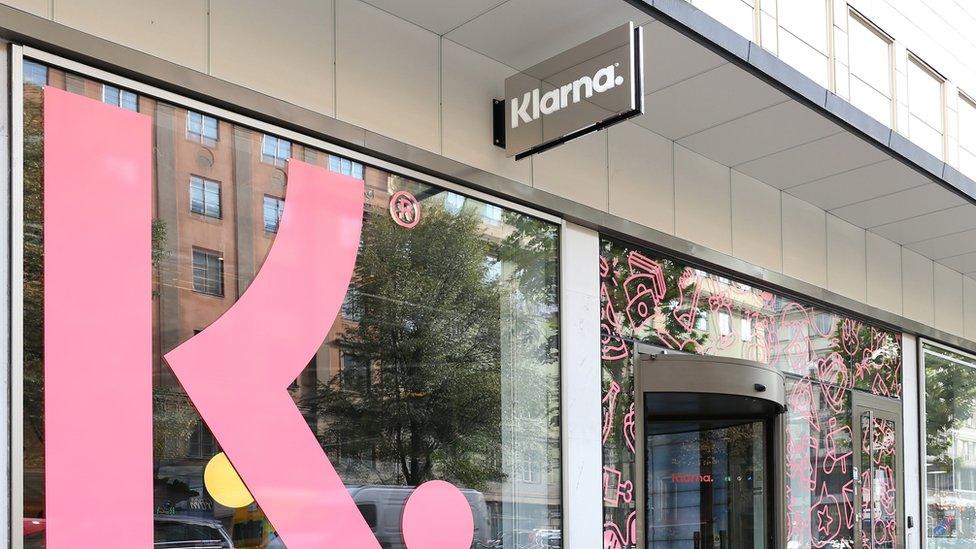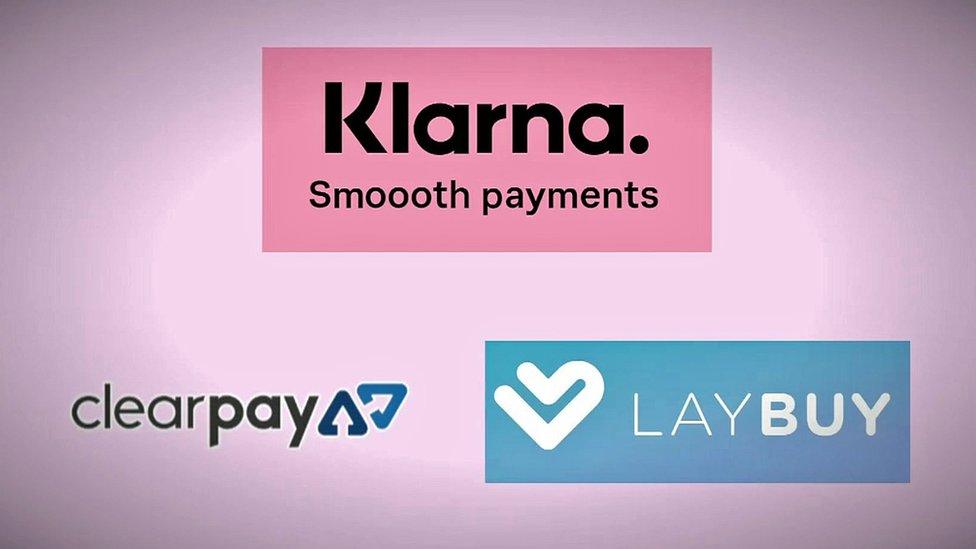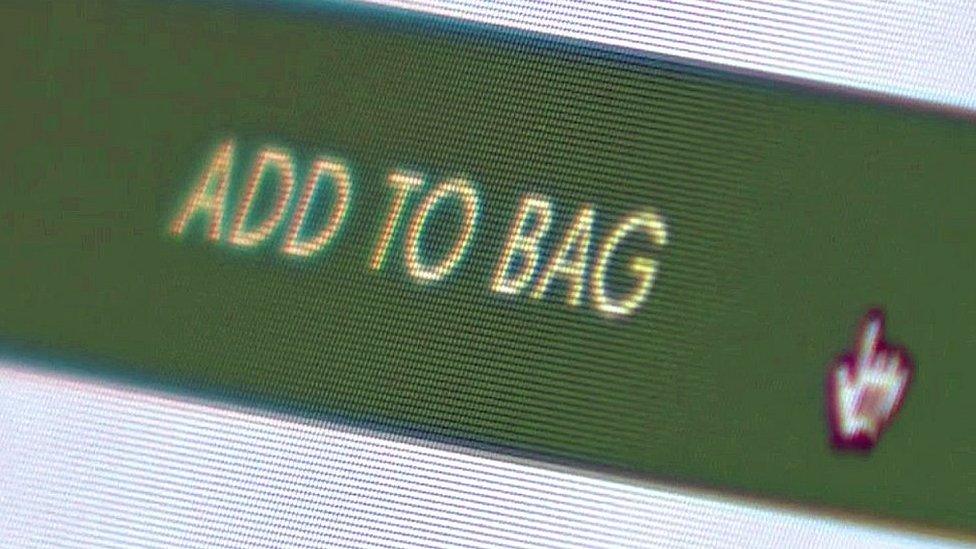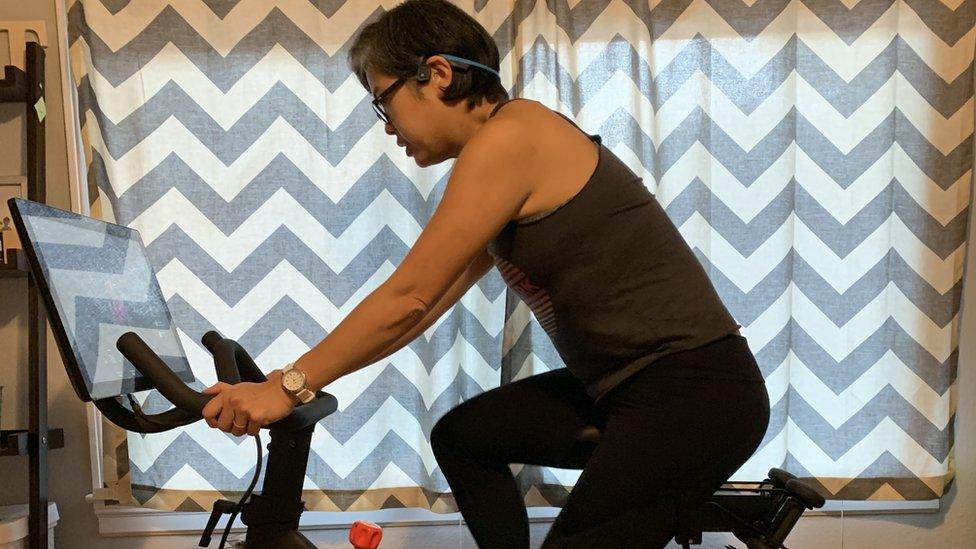Buy now, pay later 'growing fast' amid debt fears
- Published

Klarna was launched in the UK in 2014
Buy now, pay later services for online shoppers are growing at 39% a year, a report says, despite worries that young consumers are sleepwalking into debt.
Operators such as Klarna and Afterpay allow customers to delay payment or buy through interest-free instalments.
Convenience and the ease to make snap purchases are behind their popularity, according to the report by payment processors Worldpay.
But consumer groups say many young people are ignoring the debt risks.
Klarna has announced that seven million people have used its services in the UK, twice as many as a year ago.
Among them was Crystle Pearce, who bought a Peloton stationary exercise bike on Klarna after going into the store and asking about her credit options.

Peloton exercise bikes are expensive (picture posed by model)
"I do not have £2,000 to drop on a spinning bike. It is definitely a luxury, so you have to make sure, before you sign the piece of paper, that you will be able to pay it back," she told BBC 5 live's Wake Up to Money.
"If you can't, you will get yourself into so much debt. If you miss a payment, it completely affects everything. I would only recommend it to someone who is budget-savvy."
Snap buys
These debt warnings have been consistent during the rise of these "buy now, pay later" services, with consumer groups warning for some time about the dangers.
Caroline Siarkiewicz, chief executive of the Money and Pensions Service, said that falling behind on payments can affect access to borrowing in subsequent years.
"These schemes attract younger people and are pretty straightforward," she said last month. "But many are not thinking about the future enough before they sign up to take out these products."
Complaints service Resolver said it had received nearly 10,000 inquiries about the issue since it began recording them separately in September 2018.
However, the Worldpay report suggested that these services were set to double their market share of online purchases by 2023, compared with last year.
"Buy now, pay later delivers a more intuitive level of convenience and access for consumers than traditional credit cards," the report said.
"As digitally savvy Gen Z consumers come of age, this is especially significant as younger consumers are more used to making snap purchases and then deciding later if they want to keep it."
Its research suggested this was the fastest-growing online payment method in the UK, growing twice as quickly as bank transfers and more than three times the rate of annual growth in digital wallets.
However, it said digital wallets - mainly involving payment via a mobile phone - were popular in stores and would account for more than half of online payments by 2023.

Buy now, pay later: The main players

Klarna: Sweden, launched in UK in 2014
Seven million UK customers, adding 55,000 extra a week
190,000+ retailers in 17 countries, including ASOS, H&M, Topshop, Michael Kors, Samsung
Pay 30 days later or split cost of item into three equal instalments
Unpaid debts from "buy now, pay later" products are currently not referred to debt collectors
Laybuy: New Zealand, launched in UK in 2019
Would not give UK customer numbers
800+ retailers, including JD Sports, Footasylum, WH Smith, AX Paris
Pay in six instalments, interest-free, £6 late fee after 24 hours and again after seven days
Customers referred to credit agency after 45 days
ClearPay: Australia, launched in UK in 2019
500,000+ customers
Retailers include M&S, Urban Outfitters, Pretty Little Thing
Pay in four instalments within six weeks, £6 late fee after 24 hours and again after seven days
Customers can be referred to credit agency at ClearPay's discretion
- Published26 January 2020

- Published13 January 2020

- Published4 December 2019

- Published26 September 2019
